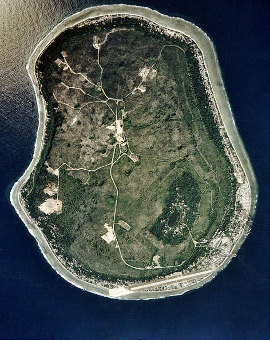Eames officially leaves questioning Nauru's grasp of law
 The chief justice of Nauru, Australian Geoffrey Eames, says he has had no option but to resign as the government is ignoring the rule of law.
The chief justice of Nauru, Australian Geoffrey Eames, says he has had no option but to resign as the government is ignoring the rule of law.
Justice Eames was forced out of the country after Nauru officials cancelled his visa in January this year. He has now tendered his resignation, saying it was impossible for him to fulfil his role from his office in Melbourne.
The Nauru government also forced the deportation of resident magistrate Peter Law and former media adviser Rod Henshaw; a move it says was to combat judicial cronyism but others say was politically motivated.
Justice Eames had his visa cancelled after he issued an injunction to intervene in the deportation Mr Law.
Both judicial figures say the move was an attempt to affect upcoming cases before the court.
Justice Eames said in an interview with Radio Australia that the tiny island’s leadership will not accept that their actions amount to a serious breach of the fundamental underpinnings of the law.
“They [Nauru government] simply don't accept that as the case,” he said.
“And as long as they don't understand that and don't accept it then the rule of law is in a very parlous state.”
He also said that the Australian government had not taken the unprecedented dismissals seriously enough, calling it “extraordinary” that they were treated as a mere “domestic dispute”.
He says negotiations between foreign ministers have failed, as Nauru refuses to admit its overreach.
“The second they characterised such a gross and patent violation of the rule of law; the second they trivialised it by making it sound as though it was a fight over parking spaces they lost all prospects of being able to get through to the Nauru government that this was a serious breach, and a serious breach to the rule of law matters.”
Justice Eames said he will be concerned for his replacement, whenever one is announced.
“Life will proceed without me being involved in it, but it will proceed in circumstances where I would think any new appointees would be extremely wary about whether their judicial independence will be compromised the moment they make a decision the government doesn't agree with.”








 Print
Print